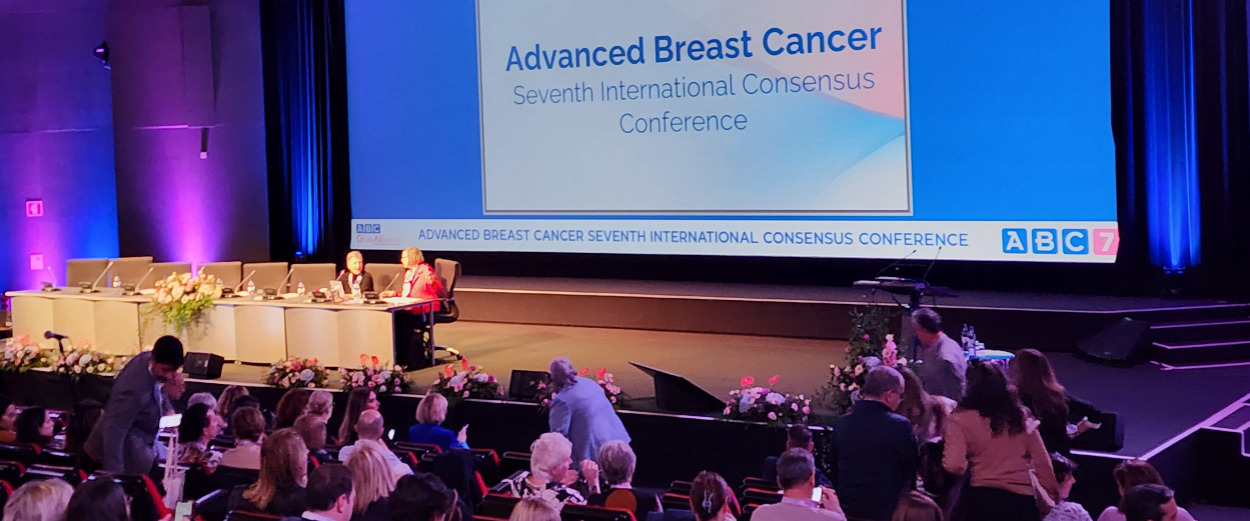CBCN had the opportunity to attend the ABC7 conference in Lisbon, Portugal from November 9 to 11, 2023. Here are some highlights from the conference:
Clinical Topics
The latest results from phase III of the PHOEBE trial show that patients with HER2+ metastatic breast cancer see significant improvements of overall survival (OS) with pyrotinib plus capecitabine.
Patients enrolled in the study were given a combination of pyrotinib plus capecitabine or a combination of lapatinib plus capecitabine. The median OS for those receiving pyrotinib was 39.4 months compared to 28.6 months for those on lapatinib. This study indicates consistent benefits with pyrotinib regardless of prior treatments.
Exploring the definition and guidelines for endocrine resistance in HR+ advanced breast cancer.
Defining endocrine resistance can help to determine whether non-hormonal therapies, like chemotherapy, should be the primary treatment for HR+ patients. Current guidelines define primary resistance as “a recurrence within 2 years of adjuvant endocrine therapy or progression within 6 months of treatment for mBC” and acquired resistance as “recurrence or progression after those timeframes”. With newer, more effective treatments and less harmful chemotherapy options available, the presenter argues that this traditional definition of resistance may need updating as many patients who don’t respond well to initial treatments can benefit from newer options at later stages. They suggest that the definition of resistance should focus more on the characteristics of a person’s cancer rather than strict timeframes.
Anti-HER2 therapies after brain metastases
This study looked at the effects of anti-HER2 therapies for metastatic breast cancer patients who developed brain metastases. Participants were treated with an anti-HER2 treatment and radiotherapy alone or in combination with surgery. The results showed that patients receiving anti-HER2 therapies after diagnosis of brain metastases had a significantly improved prognosis. The study found that factors such as the type of local treatment, the number of lines of therapy, the number of brain metastases, age, and the application of systemic treatment were associated with better survival.
The use of artificial intelligence (AI) in determining treatment outcomes of patients receiving CDK4/6 inhibitors
In this study, Canadian researchers from Sinai Health in Toronto used AI to analyze data from patients with metastatic breast cancer treated with CDK4/6 inhibitors (a therapy used in the treatment of HR+/HER2- breast cancers). AI allowed researchers to look at treatment patterns and outcomes of patients who had received CDK4/6 inhibitors combined with hormone therapy between 2016 and 2021. Researchers were able identify patients and access real world evidence that may not have been available through manual methods of retrieval. They were able to confirm effective use of CDK4/6 inhibitors as a first-line therapy for HR+/HER2- metastatic breast cancer in a real-world setting.
Treatment Considerations
Would “long responders” benefit from “treatment holidays”?
This presentation explored the idea of improving care for people with metastatic breast cancer who respond well to treatment (referred to as “long responders”). Is it beneficial for those considered “long responders” to take breaks from treatment rather than continue indefinitely on the treatment that is working? To determine the answer to this question the presenter suggests defining who would qualify as a “long responder” (likely varying based on subtype), as well as how well a patient is responding to the treatment. Patients in later lines of therapy or who have TNBC may not be suitable for treatment breaks. Ultimately, choosing to take a treatment holiday would have to take a holistic approach, factoring in prognosis, effectiveness of treatment, tolerability to treatment and a patient’s personal preferences.
Making shared decision making a success
The healthcare system has seen a positive shift towards patient-centred care. There are numerous benefits to shared decision making including reduced fear, better adherence to treatment plans, and improved quality of life. However, there are complexities to more active collaboration between a patient and their doctor. In this session, Lesley Fallowfield, UK discussed how this has impacted patients and how better communication can lead to success.
Breast cancer has become a complex disease and so has its treatments. The complex nature of this disease can make it difficult for patients, who may already be in a heightened emotional state, to navigate their options comfortably. Secondly, patients have diverse needs and understanding. They also have different decision-making preferences. Some may be passive, while others collaborative or active in their involvement of choosing treatments. Finally, patient goals may not always align with physician goals. This can be true for treatment preferences but also for the direction and goals of appointments. Challenges can appear when a person, who may be feeling unwell or anxious, struggles to express their values in the limited time they have with their doctor.
As the presenter states, “decision making is rarely ever rational”. Emotions, optimism, and uncertainty play crucial roles in decision-making, affecting how a person understands their options. Effective communication between doctors and patients is vital. This is especially true as misinformation from social media and Google can worsen anxiety. Ultimately, patients require evidence-based information that is delivered in a format beneficial to them, and in a manner that does not demean their values or knowledge. Aligning a physician’s medical advice with patients' personal lifestyles and preferences is crucial for shared decision-making in healthcare.
Enabling discussions on prognosis and end-of-life care
The presentation highlighted the critical aspects of prognosis and end-of-life care for metastatic breast cancer. Discussions about a person’s prognosis are essential, allowing individuals to properly plan for their future. Patients who are aware of their life expectancy are more likely to choose palliative care earlier, leading to a better quality of life. However, communicating prognosis is a challenging task for doctors, and a difficult topic for a patient to hear.
There are a variety of strategies doctors can use to initiate these conversations. These include checking in with patients early and often and using question prompt lists to guide discussions. (CBCN has a variety of ‘Questions to Ask your Doctor’ lists throughout our PatientPath tool). It is also important to continue to offer these discussions throughout a person’s journey of care. The type and quantity of information can vary between individuals but can also vary over the course of treatment for each person.
The presentation also focuses on how discussions of survival can be framed. One study suggested that presenting the information in three scenarios (worse case, typical, and best case) is preferred (88%) over offering one median survival datapoint (5%). Cancersurvivalrates.com can be a helpful tool for presenting information in this way but it is noted that this should be used only as a starting point for discussions with your physician as some data may be outdated and not representative to all patients.
Discussing end-of-life care is more effective with an understanding of a person’s expected prognosis. Conversations should include identifying values, priorities, preferences, available palliative care services, and end-of-life care options. Patients are more likely to receive the palliative care they prefer when they have had discussions about their wishes with their doctor.
You can read about how to access and advocate for quality end-of-life care in our advocacy guide Palliative Care in Canada.
Lifestyle
The Use of Complementary and Integrative Medicine in Advanced Breast Cancer
Integrative medicine combines traditional cancer treatment with complementary approaches and can include mindfulness-based stress reduction (MBSR), physical activity, acupuncture, diet, and vitamins, to name a few. Integrative medicines claim to help to improve quality of life by reducing the physical side effects such as pain, fatigue or cognitive impairment, and the emotional side effects such as anxiety, depression or stress. (You can read CBCN's patient magazine on complementary therapies here).
The presentation highlighted the available research demonstrating these benefits. While there is sufficient evidence showing the benefit of physical activity and MBSR, there is less evidence proving the benefits of acupuncture. There is insufficient evidence showing the benefits or harms of diet and supplements. Most vitamins are not recommended, not because they do not work but because there is just not enough evidence to prove there is no harm. Furthermore, the presentation also highlighted the lack of research specifically for the advanced breast cancer population. Most available research focuses on all stages of breast cancer or on many types of cancer in general.
Finally, the presenter stressed the importance of discussing complementary medicine with patients early in their treatment, as over 80% of patients use some form of it in their daily life. Strong communication regarding diet and supplements is especially important as there may be drug interactions the patient is unaware of. There is a clear need for more research and education on the subject of complementary medicines.
What is the current research on the relationship between diet and exercise for people with mBC?
Diet and exercise is generally known to be important for improving the quality of life for people living with metastatic breast cancer. But what does the research show?
Most research focuses on the prevention of cancer or reducing the risk of recurrence and not on improving survival or quality of life for people living with mBC. The little research we do have shows that exercise can potentially control the growth rate of a tumour but cannot reduce the existing tumour. Exercise is also shown to relieve symptoms related to cancer and its treatment including fatigue, sleep quality and depression or anxiety. Current recommendations suggest 150 minutes of moderate physical activity per week.
On the dietary front, there's a lack of specific studies for advanced breast cancer patients, and existing results are inconsistent. No conclusive evidence to support for or against the use of diet to improve survival or quality of life in patients. There is limited evidence to suggest that a plant-based diet may improve symptoms of fatigue. The current recommendations to manage challenges associated with treatment include a plant-based diet, limiting certain foods, and tailoring these changes to each person.
The presentation also addressed some barriers to implementing exercise and dietary changes in people living with mBC. Some include financial limitations, lack of trained professionals, lack of data and the need for people to be motivated to make changes. Promoting research, educating patients, setting goals, and creating a social support system are ways in which we can improve participation in diet and exercise. Ultimately, a good diet and regular exercise are crucial for the overall care and management of metastatic breast cancer but further research is necessary.
CBCN’s participation at the 7th Advanced Breast Cancer Consensus Conference was made possible in part due to travel funding provided by Roche Canada and ABC Global Alliance.







